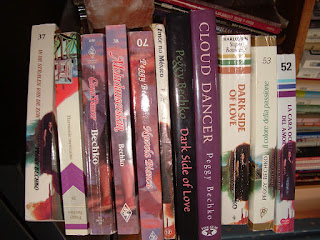 I've heard this question before, I've seen it tossed about the web. We do get wrapped up in minutia.
I've heard this question before, I've seen it tossed about the web. We do get wrapped up in minutia.
I mean really, who cares?
Why are we debating the non-issue?
We're writers, right?
And just for the record, it's both.
Yes, I know, as a writer, it's hard to explain to those who don't write exactly what it is you do. I mean you put words down on paper. It's sort of like when you were in school, right, writing papers? Pretty much anyone can do it, the real question is whether you get an "A" or an "F". And so many people say I want to write a novel, or I'll write a novel myself some day like it's writing a paper for English class.
Good luck.
Now I don't want to seem snotty here, but there's a bit more to writing a novel than thinking about it.
And then we have the argument from the visual artists who find it hard to accept writing into the 'arts'. I have a few words about some 'visual' artists, but I'll keep them to myself (please note I said some, not all).
In any event what does an artist do - create something out of nothing. A painter does that on canvas and a writer does that with words on paper or a computer screen. Where there was not story before, there is one now. The writer has written. Hopefully it's good.
And while there is a lot of craft to writing, a lot of pieces that have to be put together (you have to learn the language and how to handle it deftly in order to put your writer's ideas across in such a way that the reader doesn't want to put the book down) there is also the art of creating that amazing story. Something from nothing.
Don't forget there's a lot of 'craft' in painting as well. Techniques to be learned, different mediums to be mastered, but that doesn't make the final painting any less art when in the hands of a master.
Even some writers don't really think of themselves as artists and that's okay. As I said before, what does it matter, really? Why have such a debate?
But we have the writing - art or craft debate - so here goes
Crafting is defined as creating something, learning how to do something, following a set of instructions, probably assembling something. Well, writing has a hefty dose of that, it's true. One has to learn the language, how to write well, how to put ideas across clearly. At that point one could chose to be a copywriter or technical writer or some other venue and be on solid ground calling it a craft. That which can be learned and pretty much duplicated. Some have the 'touch' and create magical, drawing copy and others not so much, but it is something that can be learned.
But, the rub comes in for writers when they go in the highly creative "I want to write a novel" direction. Then there isn't a manual to write, instructions to create or a report to get written.
At that point the writer is facing the blank and creating something out of nothing as a painter does when he or she faces the blank canvas or the ceiling of a well-known chapel. There are the so-called 'hack' writers who can crank out novel after novel in one genre or another, following a 'formula' and many of those are even great and entertaining reads.
The jump to art comes when you acknowledge some of the amazing writers and their works that the world has seen. Just because it's words and not paint why would you not call that art? Once that line is crossed would you really stand there holding the book in your hand and say "no biggie, I can write a book just like that?" It's not like a doll made from doilies, clothespins and yarn.
Writers' books, great books, entertaining book,s move people, grab them by the throat and hold them until they finish reading.
That is what art is.
So, back to my original statement. It's both.
And again, why are we debating this?








